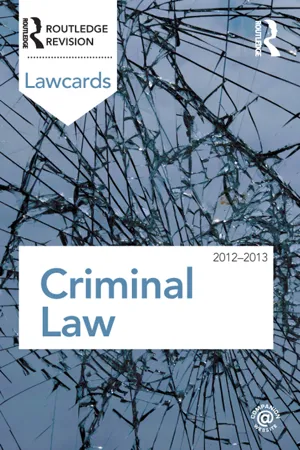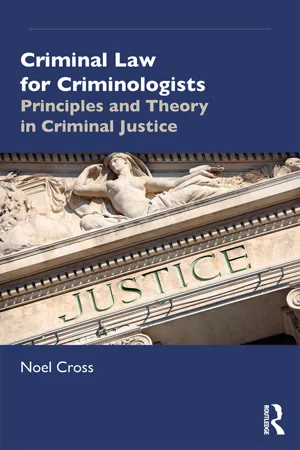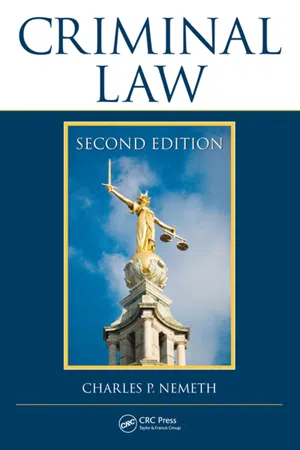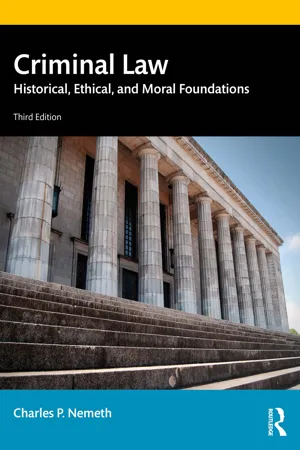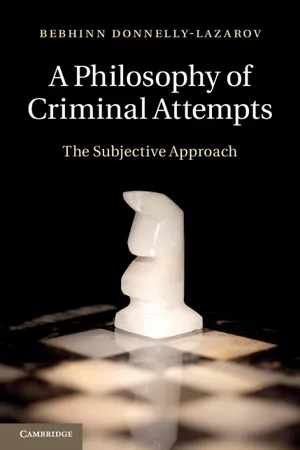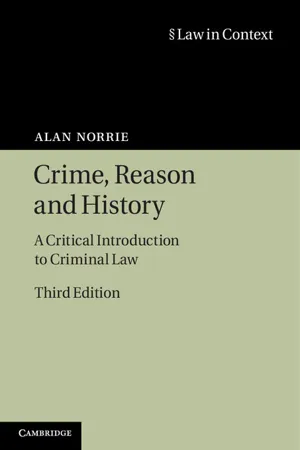Law
Actus Reus
Actus reus refers to the physical act or conduct that constitutes a criminal offense. In criminal law, it is one of the two essential elements that must be proven for a person to be convicted of a crime, the other being mens rea (the mental state of the accused). Actus reus can include actions, omissions, or a state of being that is prohibited by law.
Written by Perlego with AI-assistance
Related key terms
1 of 5
12 Key excerpts on "Actus Reus"
- eBook - ePub
- Rodger Geary(Author)
- 2012(Publication Date)
- Routledge-Cavendish(Publisher)
Chapter 2The Elements of a CrimeActus Reus and Mens ReaAs we have noted, a crime is conduct which has been defined as such by statute or by common law. It is a general principle of the criminal law that a person may not be convicted of a crime unless he has acted in a prohibited way with a defined state of mind. The prohibited act is called the Actus Reus and the defined state of mind is the mens rea of the crime. The main exceptions to this principle are ‘state of affairs’ offences, where no conduct as such need be established, and crimes of ‘strict liability’, where no mens rea need be proved. Of course, a defendant who commits an Actus Reus with the appropriate mens rea may still avoid conviction if he has a valid defence. A crime can therefore be said to consist of an Actus Reus and mens rea together with the absence of a valid defence.A convenient way of remembering this is:crime = AR + MR + absence of a valid defence.Characteristics of an Actus ReusDefinitionAn Actus Reus consists of all the elements in the statutory or common law definition of the offence except the accused’s mental elements. This can be remembered as:Actus Reus = definition of the offence – mens rea.Analysis of the Actus ReusAn Actus Reus can be identified by looking at the definition of the offence in question and subtracting the mens rea - eBook - ePub
- Routledge(Author)
- 2013(Publication Date)
- Routledge(Publisher)
[1935] ).GENERAL PRINCIPLES OF CRIMINAL LAW
See diagram on facing page.CHARACTERISTICS OF AN Actus Reus
Definition
The Actus Reus consists of all the elements in the statutory or common law definition of the offence except the defendant’s mental element. It consists of everything that the prosecution needs to prove except the mens rea .General principles of criminal lawAnalysis of the Actus Reus
The Actus Reus can be identified by looking at the definition of the offence in question and subtracting the mens rea requirements, which is usually denoted with phrases such as ‘knowingly’, ‘intentionally’, ‘recklessly’, ‘maliciously’, ‘dishonestly’ or ‘negligently’.The Actus Reus states the conduct or omission required for the offence, the specified surrounding circumstances in which it must take place and any consequences if required by the offence.This process of identifying and analysing an Actus Reus can be illustrated in relation to s 1(1) of the Criminal Damage Act 1971 , which provides:A person who without lawful excuse destroys or damages any property belonging to another intending to destroy or damage any such property or being reckless as to whether such property would be destroyed or damaged shall be guilty of an offence.Once expressions relating to the mens rea requirements of intention or recklessness have been subtracted, the Actus Reus consists of destroying or damaging property belonging to another:Conduct = the act of destroying or damaging Circumstances = the fact that the property must belong to another Consequences = the resultant damage or destructionCONDUCT AND RESULT CRIMES
In analysing the Actus Reus, it is possible to distinguish between ‘conduct’ crimes and ‘result’ crimes. Conduct crimes punish the actual conduct of the defendant. An example of a conduct crime is perjury. The offence is committed where the defendant makes a statement on oath which he knows to be false or does not believe to be true (s 1 of the Perjury Act 1911 ). The making of such a statement is sufficient to establish the Actus Reus. - eBook - ePub
Criminal Law for Criminologists
Principles and Theory in Criminal Justice
- Noel Cross(Author)
- 2020(Publication Date)
- Routledge(Publisher)
The first part of this chapter explains the rules of Actus Reus and mens rea in more detail. The second part of the chapter discusses the ways in which criminal justice uses the concepts of Actus Reus and mens rea – using the police, the Crown Prosecution Service (CPS), and the criminal court process as examples, as well as considering crime victims’ relationship with these agencies. Normally, criminal law sees Actus Reus and mens rea as separate and separable concepts (Duff 1990). However, the argument here is that criminal justice does not react to criminal behaviour by separating actions and mental responsibility in this way. Instead, it makes a judgment about a person’s criminal blameworthiness which brings together mental state and behaviour (Wells and Quick 2010: 119).Actus Reus: the lawKey Actus Reus principlesNo mens rea without Actus ReusOften, in criminal law, crime is committed when there is a combination of Actus Reus and mens rea (see later in this chapter for a discussion of mens rea). The Actus Reus for each crime must be established. It is not enough that the mens rea for the crime was present if the Actus Reus was not committed as well (Deller (1952) 36 Cr App Rep 184). Criminal law in England and Wales, as Baker (2015: 250–1) explains, insists on some expression of someone’s criminal thoughts through their actions before it will intervene to punish them.Voluntary actsNot all illegal acts count as Actus Reus. Acts must be voluntary before they can be considered as criminal behaviour. If the defendant has no control over their physical actions for some reason, and commits a crime while ‘out of control’ in this way, then there is no Actus Reus. In Hill v Baxter - eBook - ePub
Law for Criminologists
A Practical Guide
- Ursula Smartt(Author)
- 2008(Publication Date)
- SAGE Publications Ltd(Publisher)
Actus Reus – describes the conduct element of a criminal offence. It must be proved that the defendant has performed a harmful conduct or behaviour towards a victim. In other words, it must be proved that the defendant committed the offence, in particular circumstances and with specific consequences.Each criminal offence carries its own Actus Reus which will be demonstrated in the following sections with the various offences.Definition of Actus Reus :- The external element of a crime
- The activity on the part of the accused
Mens rea – the mental elementMens rea is the state of mind and defines the intention of the defendant at the time he committed the Actus Reus . ‘Rea’ refers to the criminal act and not to some moral quality. For this reason, it’s best not to use the common translation of ‘guilty mind’ which can be misleading. Have a look at the case of R v Miller (James) [1983] 2 AC 161 and see how difficult it was for the House of Lords to decide on the coincidence of Actus Reus and mens rea . In Miller , Lord Diplock referred to mens rea as ‘the conduct of the accused and his state of mind.’Causation The prosecution must show that the defendant caused the death of the victim – this is known as causation. The prosecution must also prove that the defendant intended to kill the victim or cause grievous bodily harm (GBH) to the victim under section 18 of the Offences Against the Person Act 1861 . The mens rea - eBook - ePub
Modern Criminal Law
Fifth Edition
- Mike Molan(Author)
- 2013(Publication Date)
- Routledge-Cavendish(Publisher)
CHAPTER 2Actus Reus
2.1 INTRODUCTION
The prosecution’s task is to demonstrate to the jury (or magistrates) beyond reasonable doubt:- that the defendant brought about the prohibited act, omission or state of affairs. This is called the act us reus;
- that the defendant did this with the state of mind prescribed by the definition of the crime. This is called the mens rea; and
- that the defendant is not entitled to the benefit of any defence which may have been argued on his or her behalf.
Traditionally, this is encapsulated in the Latin maxim, actus non facit reum, nisi mens sit rea, which means that an act does not make a person guilty of committing an offence unless the mind is legally blameworthy. The use of this expression has been criticised as likely to mislead those involved in the study and operation of the criminal law, not least by Lord Diplock in his speech in Miller [1983] 1 All ER 978. He pointed out that as long ago as 1889 the eminent criminal lawyer, Stephen J, in Tolson (1886– 90) 23 QBD 168; [1886–90] All ER Rep 26 ‘condemned the phrase as likely to mislead’. Lord Diplock considered that ‘it naturally suggests that, apart from all particular definitions of crimes, such a thing exists as a “mens rea”, or “guilty mind”, which is always expressly or by implication involved in every definition. This is obviously not the case, for the mental elements of different crimes differ widely’. While acknowledging that Stephen J was criticising the phrase mens rea, he believed that Actus Reus - eBook - PDF
- Charles P. Nemeth(Author)
- 2011(Publication Date)
- Routledge(Publisher)
Fundamentally, to look much beyond the act itself—the killing, the maiming, or the assault—seems a psychic exercise with no clear measure. That the offender should be more severely punished for “acts” committed with hate in one’s heart, based on these criteria, seems to expand the notion of Actus Reus into uncharted territory. Actus Reus: Voluntariness and Free Choice Coupling acts with the requisite state of mind encompasses criminal agency. Without the two elements conjoined, the prosecution of the stated charge is a legal impossibility. Acts, for crimi-nal purposes, are volitional rather than the product of compulsion, accident, reflex, or somnam-bulism. To be criminal, the act is prompted by free choice and free will in the human person. We can only hold accountable those whose wills and desires conform to the chosen activity. Hence, our system resists punishing actors who are careless, mistaken, or ignorant of events and cir-cumstances. The act must be the product of volition. Accountability inures to those who have chosen the path of wrong over right. The MPC delivers amazingly clear instructions on the nature of voluntariness. (2) The following are not voluntary acts within the meaning of this section: (a) A reflex or convulsion; (b) A bodily movement during unconsciousness or sleep; (c) Conduct during hypnosis or resulting from hypnotic suggestion; (d) A bodily movement that otherwise is not a product to the effort or determination of the actor, either conscious or habitual. 7 Actus Reus and Mens Rea 86 CASE 3.1 U.S. V. WILLIAMS 332 F. Supp. 1 (Md. 1971) Herbert F. Murray, District Judge. In this case the defendant was charged in a two-count indictment under Title 18, U.S.C.A. Sections 2113(a) and (b) with robbery of a branch of the Maryland National Bank in Cambridge, Maryland, on December 4, 1970. The case was tried nonjury on September 13 and 14, 1971. - eBook - ePub
Criminal Law
Historical, Ethical, and Moral Foundations
- Charles P. Nemeth(Author)
- 2022(Publication Date)
- Routledge(Publisher)
Yet, this is exactly how the system sometimes classifies them. This picture caricatures the human species. A better portrayal would be to show, on occasion, that certain human acts are solely the result of impulse and reflex, or to recognize that certain cases of duress and coercion are substantial enough to overwhelm the will of even the strongest player. Beyond this, it is a safe bet that the words “involuntary” and “voluntary” have lost ordinary meaning if one accepts the current mitigation environment. 15 Actus Reus : Commission versus Omission To act implies a motion of sorts, the doing, the carrying out, the physical reality of bodily motion relating to a particular deed. “Commission” properly and most uniformly describes Actus Reus. Commission signifies that the criminal agent has carried through on a chosen course of conduct. Commission puts in actual motion what the will and free choice wants and desires. For criminal purposes, the agent must voluntarily act rather than be a mover unaware of circumstance or condition. To hold otherwise would be contrary to our most fundamental notions of criminal responsibility whereby a conviction would be improper unless the actor “committed some act in furtherance of the intent.” 16 So, in a burglary, one needs to break and enter into a domicile or other facility in order to do the requisite act required for the burglary crime, or the arsonist must act by burning, singeing, imploding or exploding, charring, or blistering a structure. To rape, the doer penetrates a requisite orifice of the body lacking permission, right, or consent. These things done, these acti rei, are the deed themselves. While commission represents the primary meaning of Actus Reus, a failure to act (the omission) is the other path. Instead of commission, the criminal act finds its substance in inactivity or failure to do what is required - eBook - PDF
- Joel Samaha(Author)
- 2016(Publication Date)
- Cengage Learning EMEA(Publisher)
Now you know why the first principle of criminal liability is the requirement of an act. This requirement is as old as our law. Long before there was a legal principle of mens rea, there was the requirement of a criminal act. The requirement that intentions have to turn into deeds is called manifest criminality. It leaves no doubt about the criminal nature of the act. The modern phrase “caught red- handed” comes from the ancient idea of manifest criminality. Then, it meant catching murderers with the blood still on their hands; now, it means catching someone in any criminal act. For example, if bank customers see individuals entering the bank, drawing guns, threatening to shoot if the tellers don’t hand over money, taking the money the tellers give them, and leaving the bank with the money, their criminality—the Actus Reus and the mens rea of robbery—is manifest (Fletcher 1978, 115–16). The Actus Reus requirement serves several purposes. First, acts help to prove intent. We can’t see states of mind; we can only infer them from actions. Second, it reserves the harsh sanction of the criminal law for cases of actual danger. Third, it protects the pri- vacy of individuals. The law doesn’t have to pry into the thoughts of individuals unless the thinker crosses “the threshold of manifest criminality.” Although simple to state as a general rule, much in the principle of Actus Reus complicates its apparent simplicity (Fletcher 1978, 117). We examine four complications: the voluntary act requirement; status or condition; criminal omissions; and criminal possession. The “Voluntary” Act Requirement Only voluntary acts qualify as Actus Reus. In the words of the great justice and legal philosopher Oliver Wendell Holmes, “An act is a muscular contraction, and something more. The contraction of muscles must be willed” (Holmes 1963, 46–47). Why do only voluntary acts qualify as criminal acts? The rationale consists of four logical steps: 1. - eBook - PDF
- Bebhinn Donnelly-Lazarov(Author)
- 2015(Publication Date)
- Cambridge University Press(Publisher)
PART II The implications for criminal law 5 Actus Reus and mens rea All actions, in some dimension or other, are constituted by the reasons for which they are done; the realm of attempting is here. In their fuller ontology, actions are comprised of our knowledge, of the beliefs that we have or the movements that we make. These claims give our abilities an equal footing in action and oppose the common belief that action as such has some special or unique connection to physical movement as such; it has neither. By implication, it may at least be suggested, that when criminal law operates through a divided mens rea and Actus Reus, the latter denoting physical movement alone, it errs. Those with only some familiarity of criminal attempts may suspect that the proposition is not such a bold one. When we try, we act, but physical processes (if any) and their ‘consequences’ distort what it is that we do; whatever trying consists in, it cannot be those same processes. 1 The chapter begins by making the case that it is not possible to understand what a criminal attempt might consist in without first dis- carding the divisions of mens rea and Actus Reus. 2 This preliminary 1 Note that for reasons addressed in Chapters 1 and 2, a focus on physical movements will not illuminate actions more generally. 2 See Vincent Chiao, ‘Action and Agency in the Criminal Law’ (2009) 15 Legal Theory 15 1 3–4, for an account of why insistence on the voluntary act requirement ‘allows the theorist then to assign a clear role to mens rea doctrine: acts describe what can possibly be criminalised in the first place, and mens rea standards describe what acts are criminalised’. Chiao’s view is hard to defend at least in so far as he makes the following claim: ‘I should be clear that I am not claiming that criminal responsibility must always presuppose some conscious state of mind such as a plan or intention. - eBook - PDF
The Verdict of the Court
Passing Judgment in Law and Psychology
- Jenny McEwan(Author)
- 2003(Publication Date)
- Hart Publishing(Publisher)
Scientists are routinely called as wit-nesses into court and expected there to utilise and explain concepts which began within their own discipline but have been adapted to legal ends and may have become unrecognisable. In order to achieve its purposes, the law is willing to dis-tort and manipulate scientific principles. Experts and fact-finders alike are expected to collaborate in this endeavour. REQUIREMENT OF AN ACT (Actus Reus) 9 In Hill v Baxter 10 it was uncontested that the defendant’s car had passed through traffic lights showing red. He claimed to remember nothing of the incident, and suggested that he had been rendered temporarily unconscious by an unspecified illness. It was held on appeal that had he indeed been unconscious, through no fault of his own, he would have a defence. 11 The crime was one of absolute liability, in that no mental element of foresight was required, and no degree of negligence need be proved. But the prosecution would be unable to prove that the defendant performed the prohibited act if the defendant was not in fact driving the moving car. In law, acts involve an element of volition. Any bodily movement which is directed by a conscious brain is voluntary action: A criminal walking to execution is under compulsion if any man can be said to be so, but his motions are just as much voluntary actions as if he were to leave his place of confinement and regain his liberty. 12 A complete absence of consciousness, so that the defendant’s movements do not have the quality of action, gives rise to the defence of automatism. So also do those of a person who is conscious whilst unable to control movement, as when a man is in the kitchen carving meat, but is knocked sideways by his child, falls, and injures his wife with the knife. 13 Judges have made the same claim for ordinary sleepwalking 14 or small movements while completely asleep. - eBook - PDF
The Concept of Mens Rea in International Criminal Law
The Case for a Unified Approach
- Mohamed Elewa Badar(Author)
- 2013(Publication Date)
- Hart Publishing(Publisher)
However, because not all these jurisdictions generally follow the English approach to mens rea , special attention will be given, where appropriate, 1 Marcus Tullius Cicero (106 BC –43 BC ), quoted in Richard A Bauman, Crime and Punishment in Ancient Rome (London: Routledge, 1996) 39, fn 21. 2 ATH Smith, ‘On Actus Reus and Mens Rea’ in PR Glazebrook (ed), Reshaping the Criminal Law: Essays in Honour of Glanville Williams (London: Stevens & Sons, 1978) 95–107, 96. 3 RA Duff, Intention, Agency and Criminal Liability : Philosophy of Action and the Criminal Law (Oxford: Basil Blackwell, 1990) 34. 4 R v Moloney [1985] AC 905 (HL) 915 (Stephen Brown J). Mens Rea in Common Law Jurisdictions 32 to other common law jurisdictions, namely those of Australia, Canada and Ireland. The United States and the US Model Penal Code will be dealt with sepa-rately in chapter four. A The Sources of Criminal Law: Common Law versus Statute In England and Wales, the main source of criminal law is the common law. In other words, the law was not originally a result of systematic legislation but was created by decisions of the judges, the works of prominent scholars and various (sporadic) specific Acts. 5 In the last 35 years, the Law Commission has undertaken a project of codifying English criminal law and presently the bulk of the law is found in scattered statutes, including general doctrines such as the law of com-plicity and conspiracy. 6 However, some offences as well as general doctrines that determine criminal liability are still governed by the common law and judges still play an important role in the development of the law and the interpretation of statutory offences. 7 In Canada, there are three main sources of criminal law; the Constitution (including both the division of powers and the Canadian Charter of Rights and Freedoms), statutes (most importantly the Criminal Code of Canada) and the common law. - eBook - PDF
Crime, Reason and History
A Critical Introduction to Criminal Law
- Alan Norrie(Author)
- 2014(Publication Date)
- Cambridge University Press(Publisher)
170 Acts and omissions 7 Causation [H]itherto the judges have made little progress in establishing [the] principles [of imputation]. (Williams, 1983, 382) [T]he principles [of causation] to be found in the common law . . . are reasonably well settled and can be stated quite shortly. (The Law Commission, 1989, 188) It is trite law . . . that the meaning of causation is heavily context-specific and that Parliament (or in some cases the courts) may apply different legal rules in different situations. (Lords Hughes and Toulson, Hughes (2013) at [20]) 1 Introduction A central feature of Actus Reus is that the accused’s act or omission must have caused a result which is the object of a criminal charge. At one level the issue is the relatively straightforward one of whether an act or omission is in fact causally connected with a result (White (1910)), but there remains the further question as to whether or not the one will be imputed as a cause of the other in law. Thus, under the old rule in murder that death must ensue within a year and a day of an assault, an assault outwith that period could be the factual cause of death, but not its legal cause (Dyson (1908)). That rule was abolished by the Law Reform (Year and a Day Rule) Act 1996, but where an injury resulting in death occurred more than three years previously, the Attorney General must now agree to a prosecution. This substitutes administrative discretion for legal rule but still indicates there are non-factual considerations relevant to the constitution of legal cause. The distinction between cause in fact and in law can be expressed using a variety of terms: The but for cause is sometimes referred to as the factual cause, or the de facto cause, or the scientific cause. The important thing is to distinguish it from cause in another sense, the ‘imputable’ (or ‘legal’ or ‘effective’ or ‘direct’ or ‘proximate’) cause.
Index pages curate the most relevant extracts from our library of academic textbooks. They’ve been created using an in-house natural language model (NLM), each adding context and meaning to key research topics.

